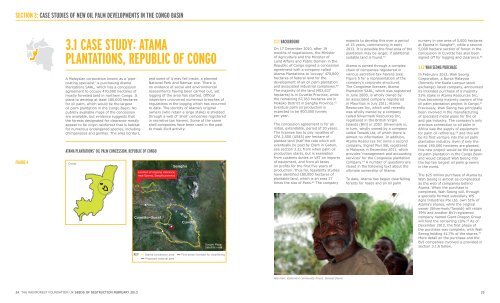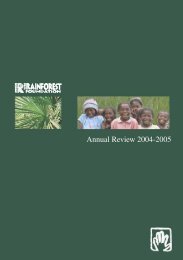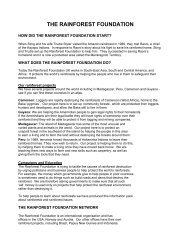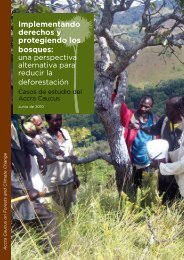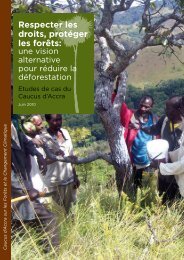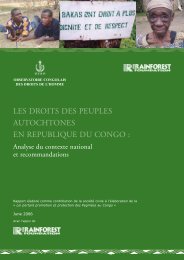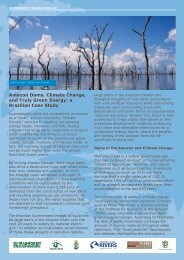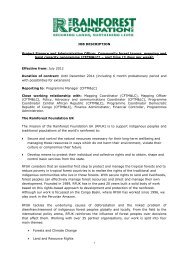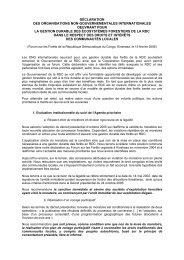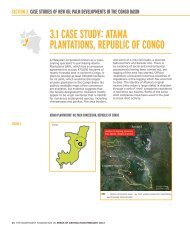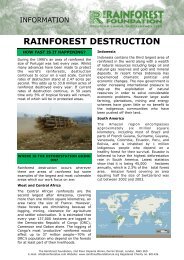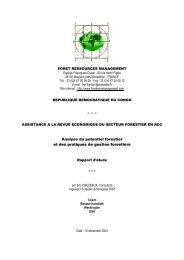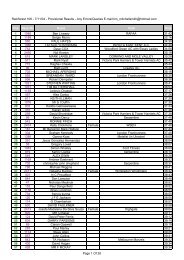Seeds of Destruction - Rainforest Foundation UK
Seeds of Destruction - Rainforest Foundation UK
Seeds of Destruction - Rainforest Foundation UK
You also want an ePaper? Increase the reach of your titles
YUMPU automatically turns print PDFs into web optimized ePapers that Google loves.
SECTION 3: CASE STUDIES OF NEW OIL PALM DEVELOPMENTS IN THE CONGO BASIN<br />
FIGURE 4<br />
3.1 CASE STUDY: ATAMA<br />
PLANTATIONS, REPUBLIC OF CONGO<br />
A Malaysian corporation known as a ‘pipecoating<br />
specialist’ is purchasing Atama<br />
Plantations SARL, which has a concession<br />
agreement to occupy 470,000 hectares <strong>of</strong><br />
mostly forested land in northern Congo. It<br />
plans to develop at least 180,000 hectares<br />
for oil palm, which would be the largest<br />
oil palm plantation in the Congo Basin. No<br />
publicly available maps <strong>of</strong> the concession<br />
are available, but evidence suggests that<br />
the forests designated for clearance mostly<br />
appear to be virgin rainforest that is habitat<br />
for numerous endangered species, including<br />
chimpanzees and gorillas. The area borders,<br />
Atama Plantations’ oil palm concession, Republic <strong>of</strong> Congo<br />
Congo<br />
and some <strong>of</strong> it may fall inside, a planned<br />
National Park and Ramsar site. There is<br />
no evidence <strong>of</strong> social and environmental<br />
assessments having been carried out, yet<br />
logging <strong>of</strong> the area has started. Official<br />
inspectors uncovered numerous breaches <strong>of</strong><br />
regulations in the logging which has occurred<br />
to date. The identity <strong>of</strong> Atama’s original<br />
owners (who retain a large stake) is shielded<br />
through a web <strong>of</strong> ‘shell’ companies registered<br />
in secretive tax havens. Some <strong>of</strong> the same<br />
shell companies have been used in the past<br />
to mask illicit activity.<br />
Location <strong>of</strong> ongoing clearance,<br />
near Epoma, Sangha province<br />
Makoua<br />
Cuvette-Ouest<br />
Cuvette-Ouest<br />
Manga<br />
Owando<br />
Sangha<br />
Sangha<br />
Makoua<br />
Cuvette<br />
Cuvette<br />
Owando<br />
Manga<br />
Google Maps<br />
Satellite view<br />
3.1.1 BACKGROUND<br />
On 17 December 2010, after 19<br />
months <strong>of</strong> negotiations, the Minister<br />
<strong>of</strong> Agriculture and the Minister <strong>of</strong><br />
Land Affairs and Public Domain in the<br />
Republic <strong>of</strong> Congo signed a concession<br />
agreement with a company called<br />
Atama Plantations to ‘occupy’ 470,000<br />
hectares <strong>of</strong> federal land for the<br />
development <strong>of</strong> an oil palm plantation<br />
and associated industrial complexes. 60<br />
The majority <strong>of</strong> the land (402,637<br />
hectares) is in Cuvette Province, while<br />
the remaining 67,363 hectares are in<br />
Mokeko District in Sangha Province. 61<br />
Eventual palm oil production is<br />
expected to be 900,000 tonnes<br />
per year.<br />
The concession agreement is for an<br />
initial, extendable, period <strong>of</strong> 30 years.<br />
The licensee has to pay royalties <strong>of</strong><br />
CFA 2,500 (US$5) per hectare <strong>of</strong><br />
planted land (half the rate which will<br />
eventually be paid by Olam in Gabon,<br />
see section 3.2), from when palm oil<br />
production starts, but is exempted<br />
from customs duties or VAT on imports<br />
<strong>of</strong> equipment, and from all taxes<br />
on pr<strong>of</strong>its for the first five years <strong>of</strong><br />
production. Thus far, feasibility studies<br />
have identified 180,000 hectares <strong>of</strong><br />
plantable land, which is an area 17<br />
times the size <strong>of</strong> Paris. 62 The company<br />
expects to develop this over a period<br />
<strong>of</strong> 15 years, commencing in early<br />
2013. It is possible the final area <strong>of</strong> the<br />
plantation may be larger, if additional<br />
suitable land is found. 63<br />
Atama is owned through a complex<br />
chain <strong>of</strong> companies registered in<br />
various secretive tax-havens (see<br />
Figure 5 for a representation <strong>of</strong> the<br />
company’s corporate structure).<br />
The Congolese licensee, Atama<br />
Plantation SARL, which was registered<br />
in June 2008, is wholly owned by<br />
an associated company registered<br />
in Mauritius in July 2011, Atama<br />
Resources Inc, which until recently<br />
was wholly owned by a company<br />
called Silvermark Resources Inc,<br />
registered in the British Virgin<br />
Islands (BVI) in 2007. Silvermark is,<br />
in turn, wholly owned by a company<br />
called Tanaldi Ltd, <strong>of</strong> which there is<br />
almost no information. In addition,<br />
Atama Resources Inc owns a second<br />
company, Signet Plus SB, registered<br />
in Malaysia in December 2011, which<br />
provides ‘management and accounting<br />
services’ for the Congolese plantation<br />
company. 64 A number <strong>of</strong> questions are<br />
raised in the following text about the<br />
ultimate ownership <strong>of</strong> Atama.<br />
To date, Atama has begun clearfelling<br />
forests for roads and an oil palm<br />
nursery in one area <strong>of</strong> 5,000 hectares<br />
at Epoma in Sangha 65 , while a second<br />
5,000 hectare section <strong>of</strong> forest in the<br />
concession in Cuvette has also been<br />
signed <strong>of</strong>f for logging and clearance. 66<br />
3.1.2 WAH SEONG PURCHASE<br />
In February 2012, Wah Seong<br />
Corporation, a Bursa Malaysia<br />
(formerly the Kuala Lumpur stock<br />
exchange) listed company, announced<br />
its intended purchase <strong>of</strong> a majority<br />
51% stake in Atama Resources Inc,<br />
thus becoming majority owners <strong>of</strong> the<br />
oil palm plantation project in Congo. 67<br />
Previously, Wah Seong has principally<br />
been involved in the manufacturing<br />
<strong>of</strong> specialist metal pipes for the oil<br />
and gas industry. The company’s only<br />
previous connection to oil palm in<br />
Africa was the supply <strong>of</strong> equipment<br />
for palm oil refineries, 68 and this will<br />
be its first venture into the oil palm<br />
plantation industry. Even if only the<br />
initial 180,000 hectares are planted,<br />
this new project would be the largest<br />
oil palm plantation in the Congo Basin<br />
and would catapult Wah Seong into<br />
the top ten largest oil palm growers<br />
in the world.<br />
The $25 million purchase <strong>of</strong> Atama by<br />
Wah Seong is almost as complicated<br />
as the web <strong>of</strong> companies behind<br />
Atama. When the purchase is<br />
completed, Wah Seong will, through<br />
a specially formed subsidiary WS<br />
Agro Industries Pte Ltd, own 51% <strong>of</strong><br />
Atama’s shares, while the original<br />
owner (Silvermark/Tanaldi) will retain<br />
39% and another BVI-registered<br />
company named Giant Dragon Group<br />
will hold the remaining 10%. 69 As <strong>of</strong><br />
December 2012, the first phase <strong>of</strong><br />
the purchase was complete, with Wah<br />
Seong holding 41.7% <strong>of</strong> the shares. 70<br />
More detail on the purchase and the<br />
BVI companies involved is provided in<br />
section 3.1.6 below.<br />
KEY Atama concession area First areas licensed for clearfelling<br />
Proposed national park<br />
Aka man, statement community forest, Samuel Dieval<br />
24 THE RAINFOREST FOUNDATION <strong>UK</strong> SEEDS OF DESTRUCTION FEBRUARY 2013 25


